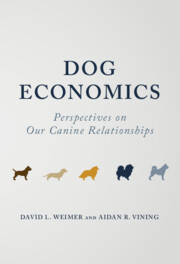Book contents
7 - Working for the Man
Canine Occupations
Published online by Cambridge University Press: 11 January 2024
Summary
In Chapter 7, we expand on the working roles of dogs and classify current canine occupations. We introduce the theory of comparative advantage and note its important role in evolutionary science. We classify canine occupations in terms of two dimensions: the type of dog advantage (comparative, absolute, or unique) and whether the occupation requires a higher or lower level of training. These occupations include service (guide, hearing, disabled, and psychiatric assistance), emotional support, therapy, hunting, herding, racing, search & rescue, substance detection, police work, diabetic alerting, cancer detection, and seizure alerting. We explain the trade-offs between selection and training across occupations, both in terms of breeds and juvenile dogs within breeds. We examine two studies that employ cost-benefit analysis. First, we present an analysis of the social benefits of guide dogs. Second, we discuss the controversy surrounding the treatment of emotional support animals in air travel and the cost-benefit analysis the Department of Transportation used to support its rule that allowed airlines to treat emotional support animals as pets rather than as service animals.
Keywords
- Type
- Chapter
- Information
- Dog EconomicsPerspectives on Our Canine Relationships, pp. 137 - 174Publisher: Cambridge University PressPrint publication year: 2024



